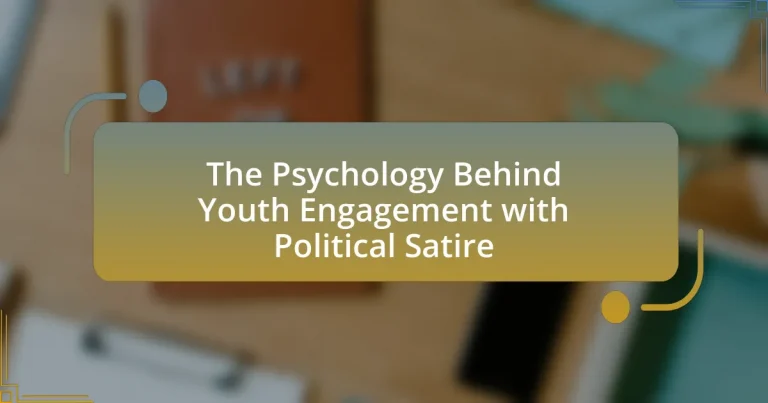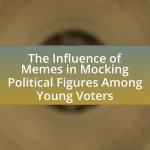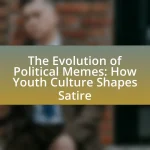The article examines the psychology behind youth engagement with political satire, highlighting the cognitive and emotional factors that drive this phenomenon. It discusses how satire simplifies complex political narratives, making them more accessible and relatable for young audiences, while fostering critical thinking and political discourse. Key psychological theories, such as Social Identity Theory and Confirmation Bias, are explored to understand how youth interpret and engage with satirical content. Additionally, the article addresses the role of social media in amplifying the impact of political satire and the influence of cultural background on youth engagement levels. Practical strategies for educators and content creators to enhance youth engagement with political satire are also presented.
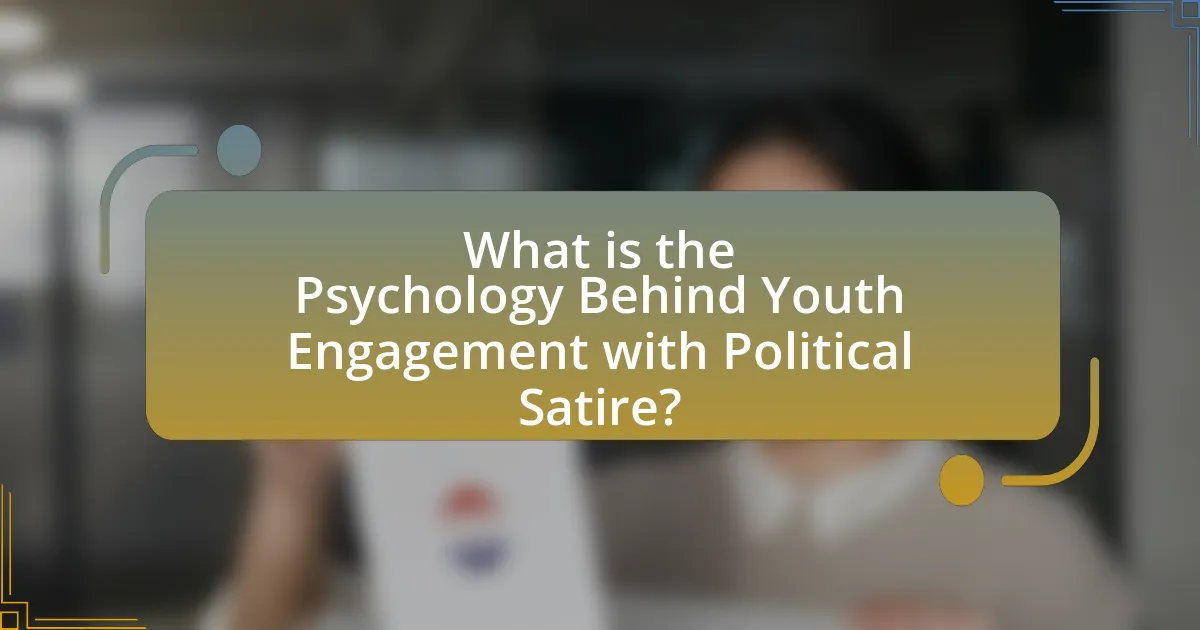
What is the Psychology Behind Youth Engagement with Political Satire?
Youth engagement with political satire is driven by a combination of cognitive and emotional factors that enhance their understanding of political issues while providing a sense of community. Cognitive psychology suggests that satire simplifies complex political narratives, making them more accessible and relatable for young audiences. This simplification allows youth to critically engage with political content, fostering analytical skills and encouraging political discourse.
Moreover, emotional responses to humor in satire create a bond among peers, as shared laughter can strengthen social connections and promote collective identity. Research indicates that young people are more likely to engage with political content that resonates emotionally, as humor can reduce defensiveness and increase openness to new ideas. For instance, a study published in the journal “Political Psychology” by M. A. Young and colleagues found that exposure to political satire significantly increased political interest and engagement among youth, highlighting the effectiveness of humor in motivating political participation.
How does political satire resonate with youth audiences?
Political satire resonates with youth audiences by providing a relatable and humorous lens through which they can engage with complex political issues. This demographic often seeks content that simplifies and critiques political narratives, making satire an effective tool for fostering political awareness and discussion. Research indicates that young people are more likely to consume political content that is entertaining, with studies showing that platforms like social media amplify the reach of satirical content, thereby increasing its impact on youth engagement. For instance, a study by the Pew Research Center found that 61% of young adults aged 18-29 reported that they often encounter political satire online, highlighting its prevalence and influence in shaping their political views.
What psychological factors influence youth perception of political satire?
Youth perception of political satire is influenced by cognitive biases, social identity, and emotional responses. Cognitive biases, such as confirmation bias, lead youth to favor satire that aligns with their pre-existing beliefs, reinforcing their views. Social identity plays a crucial role, as young individuals often relate to satirical content that reflects their group affiliations, enhancing their engagement. Emotional responses, particularly humor and outrage, significantly affect how youth interpret political satire; humor can facilitate acceptance of critical viewpoints, while outrage can motivate political action. Research indicates that these psychological factors shape not only how youth perceive satire but also their overall political engagement and attitudes.
How does humor affect youth engagement with political content?
Humor significantly enhances youth engagement with political content by making complex issues more relatable and accessible. Research indicates that humor can lower psychological barriers, allowing young audiences to process political messages more effectively. For instance, a study published in the journal “Political Communication” by M. A. Young and J. J. T. McLeod found that humorous political satire increases interest and discussion among youth, as it encourages them to share content on social media platforms. This engagement is further supported by the fact that humorous content often leads to higher retention rates of political information, as laughter creates positive emotional associations with the subject matter.
Why is political satire an effective tool for youth engagement?
Political satire is an effective tool for youth engagement because it simplifies complex political issues, making them more relatable and accessible. By using humor and irony, political satire captures the attention of young audiences, encouraging them to think critically about societal issues. Research indicates that humor can enhance information retention and stimulate discussion, which is crucial for fostering political awareness among youth. For instance, a study published in the journal “Political Communication” found that satirical content significantly increases political interest and engagement among younger demographics, demonstrating its power as a catalyst for civic participation.
What role does relatability play in youth engagement with satire?
Relatability significantly enhances youth engagement with satire by allowing young audiences to connect personally with the content. When satire reflects the experiences, values, and concerns of youth, it fosters a sense of understanding and resonance, making the humor more impactful. Research indicates that relatable satire can increase emotional responses and cognitive engagement, as seen in studies where young viewers reported higher enjoyment and comprehension of satirical content that mirrored their own social realities. This connection not only encourages sharing and discussion among peers but also promotes critical thinking about the underlying issues presented in the satire.
How does political satire foster critical thinking among young audiences?
Political satire fosters critical thinking among young audiences by encouraging them to analyze and question political narratives. This genre of humor often highlights inconsistencies, biases, and absurdities in political discourse, prompting viewers to reflect on the underlying messages and motivations of political figures. Research indicates that exposure to political satire can enhance media literacy, as young audiences learn to discern between factual information and opinion-based content. For instance, a study published in the journal “Political Communication” by researchers at the University of Pennsylvania found that individuals who engage with satirical content demonstrate improved critical thinking skills and a greater ability to evaluate political information critically. This engagement not only stimulates discussion but also empowers young people to form their own opinions based on a more nuanced understanding of political issues.
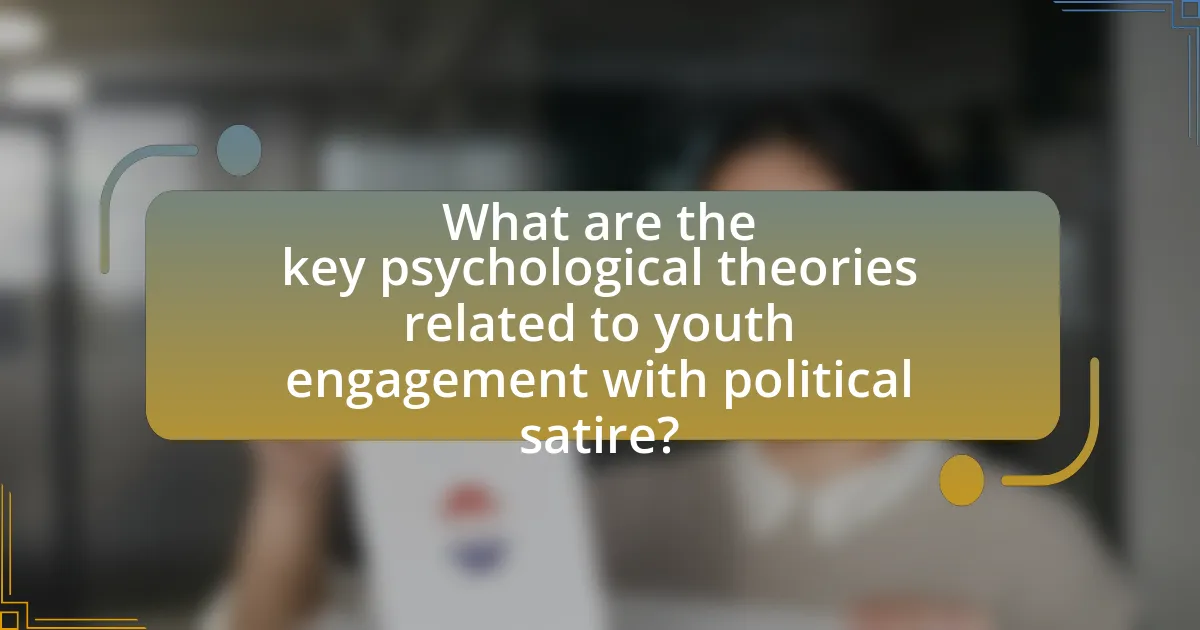
What are the key psychological theories related to youth engagement with political satire?
Key psychological theories related to youth engagement with political satire include the Social Identity Theory, the Uses and Gratifications Theory, and the Inoculation Theory. Social Identity Theory posits that individuals derive part of their identity from the groups they belong to, influencing their engagement with political satire that aligns with their social or political affiliations. The Uses and Gratifications Theory suggests that youth actively seek out political satire to fulfill specific needs, such as entertainment, social interaction, or political awareness. Inoculation Theory indicates that exposure to political satire can strengthen pre-existing beliefs by exposing youth to counterarguments in a humorous context, making them more resilient to opposing viewpoints. These theories collectively explain how psychological factors drive youth to engage with political satire, shaping their political perceptions and behaviors.
How do social identity and group dynamics influence engagement?
Social identity and group dynamics significantly influence engagement by shaping individuals’ perceptions and behaviors within social contexts. When individuals identify with a particular group, they are more likely to engage in activities that align with the group’s norms and values, fostering a sense of belonging and motivation. Research indicates that social identity can enhance participation in group-related activities, as individuals seek to affirm their identity and gain social approval. For example, a study by Tajfel and Turner (1979) on social identity theory demonstrates that individuals are motivated to engage in behaviors that promote their in-group, leading to increased involvement in group activities. Additionally, group dynamics, such as cohesion and collective efficacy, further enhance engagement by creating an environment where individuals feel supported and empowered to participate actively.
What is the impact of in-group versus out-group dynamics in political satire?
In-group versus out-group dynamics significantly influence the effectiveness and reception of political satire. Political satire often targets specific groups, creating a sense of belonging among in-group members while alienating out-group individuals. This dynamic can enhance the humor and relatability for those within the in-group, as they share common beliefs and experiences, leading to increased engagement and reinforcement of their political views. Conversely, out-group members may feel marginalized or attacked, which can result in defensive reactions or further entrenchment of their opposing beliefs. Research indicates that satire that resonates with in-group members can strengthen group identity and solidarity, while satire perceived as targeting out-group members can exacerbate polarization, as seen in studies analyzing audience reactions to satirical content during election cycles.
How does social media amplify the effects of political satire on youth?
Social media amplifies the effects of political satire on youth by providing a rapid and widespread platform for sharing and engaging with satirical content. This immediacy allows youth to access political satire in real-time, facilitating discussions and reactions that can quickly go viral. Research indicates that platforms like Twitter and Instagram enable users to share satirical content with their networks, increasing visibility and engagement; for instance, a study by the Pew Research Center found that 55% of young adults often encounter political satire on social media, which influences their political opinions and awareness. Additionally, the interactive nature of social media encourages youth to participate in the creation and dissemination of satire, further enhancing its impact on their political perceptions and engagement.
What cognitive biases affect youth interpretation of political satire?
Cognitive biases that affect youth interpretation of political satire include confirmation bias, the Dunning-Kruger effect, and the illusory truth effect. Confirmation bias leads youth to favor information that aligns with their pre-existing beliefs, causing them to misinterpret satire that contradicts those beliefs. The Dunning-Kruger effect results in youth overestimating their understanding of political issues, which can skew their interpretation of satire as they may not recognize its nuances. The illusory truth effect causes repeated exposure to satirical content to be perceived as more truthful, influencing youth to accept satirical claims as factual. These biases collectively shape how young audiences engage with and understand political satire, often leading to misinterpretations and reinforcing existing viewpoints.
How does confirmation bias shape youth responses to political satire?
Confirmation bias significantly influences youth responses to political satire by leading them to favor content that aligns with their pre-existing beliefs. This cognitive bias causes young individuals to interpret satirical messages in a way that reinforces their political views, often dismissing or misinterpreting satire that contradicts their opinions. Research indicates that when exposed to political satire, youth are more likely to engage with and share content that resonates with their ideological stance, thereby perpetuating their beliefs and limiting exposure to diverse perspectives. For instance, a study published in the journal “Political Communication” found that individuals with strong partisan identities are more likely to enjoy and share satirical content that aligns with their political views, demonstrating how confirmation bias shapes their engagement with political satire.
What is the role of the Dunning-Kruger effect in youth engagement with satire?
The Dunning-Kruger effect plays a significant role in youth engagement with satire by influencing their perception of their own understanding and critical thinking skills. This cognitive bias leads individuals with limited knowledge to overestimate their competence, which can result in a heightened engagement with satirical content as they believe they grasp the underlying messages better than they actually do. Research indicates that young people, who may lack experience in political discourse, often misinterpret satire, believing it to be straightforward commentary rather than nuanced critique. This misjudgment can lead to a superficial engagement with complex political issues, as evidenced by studies showing that individuals with lower levels of knowledge are more likely to engage with satirical media without fully comprehending its implications.
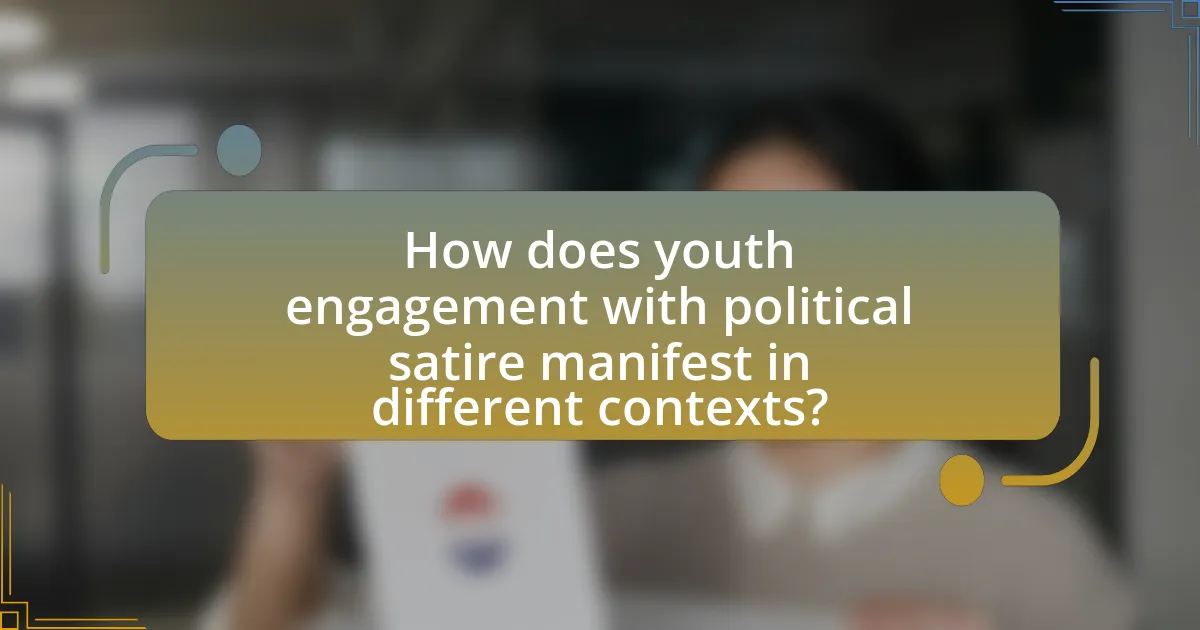
How does youth engagement with political satire manifest in different contexts?
Youth engagement with political satire manifests through various forms such as social media interactions, participation in satirical events, and consumption of satirical content across different platforms. In social media contexts, platforms like Twitter and TikTok allow youth to share and create memes that critique political figures, fostering a sense of community and activism. Research indicates that 60% of young people use social media to engage with political content, highlighting its role in shaping political opinions. Additionally, youth often attend live comedy shows or satirical performances, where they connect with peers and discuss political issues in a humorous context, reinforcing their political awareness. This engagement is further supported by studies showing that exposure to political satire can enhance critical thinking and political efficacy among young audiences, making them more likely to participate in civic activities.
What are the various platforms where youth engage with political satire?
Youth engage with political satire primarily on social media platforms such as Twitter, Instagram, TikTok, and Facebook. These platforms facilitate the sharing of satirical content through memes, videos, and posts, allowing for rapid dissemination and interaction. Research indicates that 71% of young people use social media to follow political news, which often includes satirical commentary, highlighting its role in shaping political opinions and engagement among this demographic.
How do traditional media and social media differ in their impact on youth engagement?
Traditional media and social media differ significantly in their impact on youth engagement, with traditional media often providing a one-way communication model while social media facilitates interactive and participatory engagement. Traditional media, such as television and newspapers, typically deliver content that youth consume passively, resulting in limited opportunities for feedback or interaction. In contrast, social media platforms like Instagram and Twitter allow youth to actively engage with content, share their opinions, and participate in discussions, which can enhance their sense of agency and involvement in political discourse. Research indicates that 71% of young people use social media to engage with political issues, highlighting its role in fostering active participation compared to the more passive consumption associated with traditional media.
What role do memes play in the dissemination of political satire among youth?
Memes serve as a crucial vehicle for the dissemination of political satire among youth by leveraging humor and relatability to engage and inform. This format allows for complex political ideas to be simplified and shared rapidly across social media platforms, making them accessible to a younger audience. Research indicates that 55% of young people encounter political content primarily through memes, highlighting their effectiveness in shaping political discourse. Furthermore, the viral nature of memes facilitates the rapid spread of satirical content, fostering a shared cultural understanding and encouraging political discussions among peers.
How does cultural background influence youth engagement with political satire?
Cultural background significantly influences youth engagement with political satire by shaping their values, humor, and understanding of political contexts. For instance, youth from cultures with a strong tradition of satire, such as in the United States or the United Kingdom, are more likely to appreciate and engage with political satire as a form of social commentary. Research indicates that cultural familiarity with satire enhances its effectiveness; a study by the Pew Research Center found that young people who identify with a culture that values humor in political discourse are more likely to share and discuss satirical content. Additionally, cultural norms dictate what is considered acceptable humor, which can either encourage or discourage youth from engaging with political satire based on their societal context.
What differences exist in engagement levels across diverse cultural contexts?
Engagement levels vary significantly across diverse cultural contexts due to differing values, communication styles, and social norms. For instance, collectivist cultures, such as those in East Asia, often emphasize group harmony and may engage with political satire in a way that aligns with community perspectives, whereas individualistic cultures, like those in the United States, may prioritize personal expression and critique, leading to more direct engagement with satire. Research indicates that youth in collectivist societies may respond more positively to satire that reinforces social cohesion, while youth in individualistic societies may favor satire that challenges authority or provokes thought. This difference is supported by studies showing that cultural background influences humor appreciation and political discourse, highlighting the importance of context in shaping engagement levels.
How do cultural values shape the interpretation of political satire?
Cultural values significantly shape the interpretation of political satire by influencing what is considered humorous or acceptable within a society. For instance, in cultures that prioritize individualism, satire may focus on personal accountability and critique of authority figures, while collectivist cultures might emphasize community values and social harmony, leading to satire that critiques societal norms rather than individuals. Research indicates that cultural context affects humor perception; a study by Shifman and Lemish (2010) found that audiences from different cultural backgrounds interpret the same satirical content differently based on their cultural norms and values. This demonstrates that cultural values not only inform the creation of political satire but also dictate how it is received and understood by various audiences.
What practical strategies can enhance youth engagement with political satire?
To enhance youth engagement with political satire, integrating interactive platforms that allow for real-time participation is essential. For instance, utilizing social media channels like TikTok or Instagram can facilitate the creation and sharing of satirical content, making it more relatable and accessible to younger audiences. Research indicates that 60% of young people engage with political content on social media, highlighting its effectiveness as a medium. Additionally, incorporating educational elements, such as workshops or discussions that explain the context and significance of the satire, can deepen understanding and appreciation. This approach not only fosters critical thinking but also encourages active participation in political discourse, as evidenced by programs that have successfully increased youth involvement in civic activities through satire.
How can educators effectively use political satire to engage youth in discussions?
Educators can effectively use political satire to engage youth in discussions by incorporating relatable and contemporary satirical content that resonates with their experiences and interests. This approach captures attention and stimulates critical thinking, as satire often highlights societal issues in a humorous yet thought-provoking manner. Research indicates that youth are more likely to engage with material that is entertaining and relevant, making satire a powerful tool for sparking dialogue about political and social topics. For instance, studies show that satirical programs like “The Daily Show” and “Saturday Night Live” have successfully increased political awareness among younger audiences, demonstrating the effectiveness of satire in fostering discussions about current events and civic engagement.
What are best practices for creating relatable political satire for young audiences?
Best practices for creating relatable political satire for young audiences include using humor that resonates with their experiences, incorporating current events that matter to them, and employing accessible language. Young audiences often connect with satire that reflects their daily lives and concerns, such as social justice, climate change, and technology. For instance, studies show that humor can enhance engagement and retention of political messages, making it crucial to align satire with the values and interests of younger demographics. Additionally, utilizing platforms popular among youth, such as social media, can amplify reach and impact, as evidenced by the success of satirical content on platforms like TikTok and Instagram.
